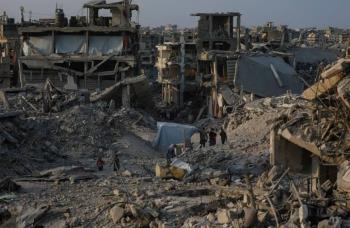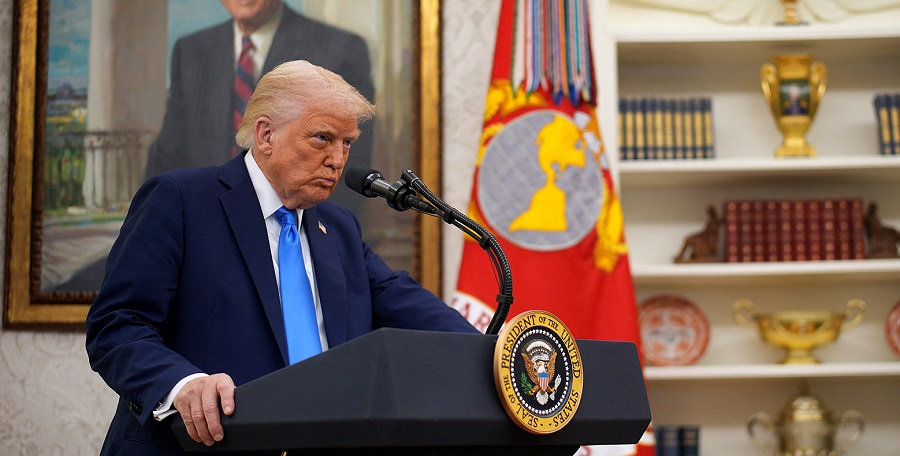Alwaght- Less than five months after the Israeli aggression on Iran, the US President Donald Trump has recently in remarks claimed responsiblity for the attacks on Iran, including the June 13 Israeli attack on Iran. In a dinner with the leaders of Central Asian countries, Trump said that during the attack, he was "very much in charge." He described the attacks "very powerful", claiming that the damage caused by the first attack exceeded all of the next attacks.
These remarks contradict his first comments about the 12-day war. A day after the Israeli war on Iran, Trump denied to American media his country's direct role in the attacks, claiming that he was just aware of the attacks.
Iran's legal action
Following Trump’s admission of his role in the act of aggression against Iran, the Islamic Republic now has legal grounds to pursue judicial action against the U.S president's administration for unlawful acts of aggression.
In a direct response, Iran's UN Ambassador, Amir Saeid Iravani, has formally notified the United Nations. In a letter to the UN Secretary-General Antonio Guterres and the President of the Security Council, which is now Russia, Iravani stated that the criminal admission by the senior-most US official serves as undeniable proof and carries significant international legal consequences. He asserted that this confession solidifies US and Israeli responsibility for their aggressive acts.
Iravani's letter detailed the shared responsibility of Washington and Tel Aviv for the consequences of their aggression, which he listed as including the killing of innocent civilians, widespread destruction of property and civilian infrastructure, and the deliberate targeting of Iran's peaceful, safeguarded nuclear facilities.
The senior diplomat further emphasized that this admission reinforces Iran's inherent and sovereign right to pursue all available international legal channels. He stated that Iran will seek to ensure full accountability for the US and its officials and demand full reparations, including compensation for the victims, the wounded, and all damages inflicted upon the Islamic Republic of Iran and its people, in accordance with international law.
Iran's legitimate right to respond
With Trump's admission for complicity in the Israeli aggression on Iran, now Tehran holds the legal right for legitimate response to the aggression. According to the legitimat self-defense right under the international law, any country coming under armed attack has the right to defend itself. This defense right can be either individual or collective. Legitimate individual defense is that any country attacked can use its own armed forces for defense. Iran now reserves the right to respond to the American and Israeli hostility.
Iran's assertion of its right to self-defense is contingent upon meeting specific international legal criteria, which it argues are being fulfilled in the wake of the admitted aggression.
First, an armed attack must be proven. Iranian authorities state that the US-backed act of aggression against its territory definitively meets this condition.
Second, self-defense must be a necessary last resort, meaning all other peaceful avenues for resolution have been exhausted. Officials in Tehran acknowledge that this could change if Washington were to accept a peaceful settlement and pay reparations for the damages. However, they point out that despite Iran's requests, US officials have shown no intention of offering compensation, leaving a peaceful resolution with little prospect.
Third, any defensive action must be proportionate to the initial attack. This principle means a country attacked with conventional weapons is not permitted to respond with weapons of mass destruction. Iran has clarified that its response would be proportionate and commensurate with the aggressive acts carried out by US and Israeli officials.
Trump's conflicting claims
It should be taken into account that Trump's claims about successful attacks on Iran contract with reports and comments of experts about the results of anti-Iranian attacks, with many saying the US and Israel have failed to meet their aims of war.
Assessments of American security experts: At least 8 US security agencies and experts have concluded that America's airstrikes did not destroy Iran's nuclear program. According to their assessments, the program remains intact and has been set back by only a few months at best. Iran retains its capability to enrich uranium. An exclusive NBC News report corroborates this, revealing that a new US assessment found the airstrikes destroyed just one of three intended nuclear sites. Trump had rejected a broader military plan for weeks-long comprehensive attacks.
Admission by former national security advisor: In a striking admission, former Biden administration National Security Advisor Jake Sullivan stated that the attack on Iran's nuclear facilities was ineffective. Sullivan advocates for a weak Iran whose nuclear capabilities are locked down for decades by an agreement, conceding that the military action provided only a temporary, limited delay.
Defense Intelligence Agency report: The Defense Intelligence Agency (DIA) was among the first to issue its evaluation, directly countering claims of the program's total destruction. The DIA reported that the strikes set back Iran's nuclear progress by a mere three to six months.
Adding to this consensus, former Secretary of State Antony Blinken warned in a recent interview that the attack may have backfired. He stated that while Iran had not previously decided to weaponize its nuclear program, it may now choose to do so, moving its program deeper underground. This underscores that not only was Iran's nuclear program not destroyed, but also the country also retains the short-term capability to build an atomic bomb.
CENTCOM evaluation: The US Central Command in its initial command said that the air attacks did not destroy the Iranian nuclear sites. According to the report, the main segments of the program were not destroyed and it was delayed only for several months.
New York Times and classified findings: The New York Times in a report said that classified findings show that the US attack blocked the entries of the nuclear sites , but the underground facilities have not collapsed.
Washington Post report: The Washington Post reported that information on the Iran damage show that two nuclear sites were not destroyed. The US officials who have obtained information on the US's anti-Iranian operation warn that claims of full destruction of the sites could be an exaggeration.



























